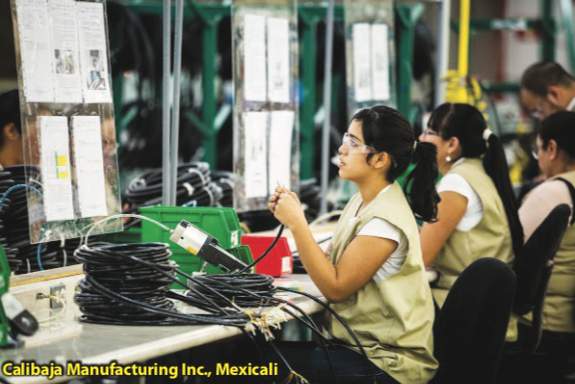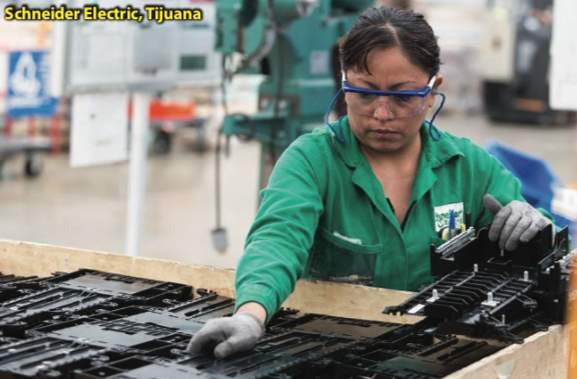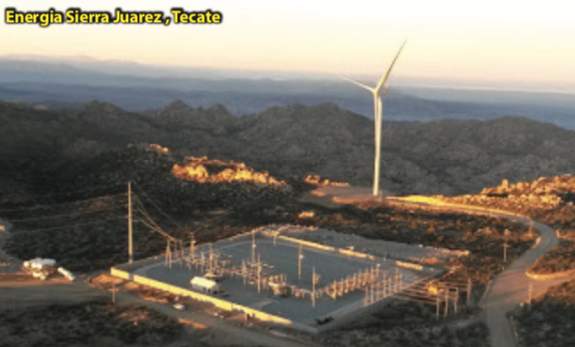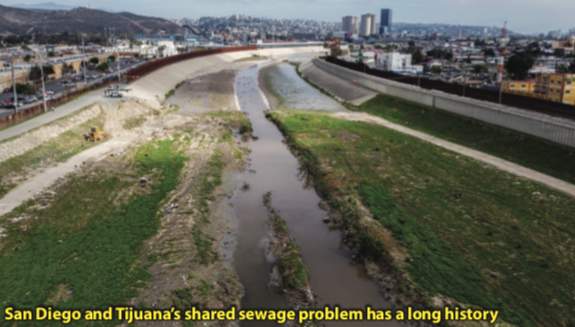CaliBaja Seeks Collaboration as U.S.-Mexico Relations Sour

By Wendy Fry
While international relations between the U.S. and Mexico sour, regional border leaders are stepping up to strengthen the relationship between San Diego and Tijuana.
The two border cities have long valued their collaboration with each other, but that alliance may be facing its strongest test yet as the friction-laden U.S. relationship with Mexico is showing signs of strain over trade, security cooperation and opposing views on renewable energy, among other issues.
At a local level, cross-border sewage spills and COVID-19 pandemic responses threaten those longtime bonds.
Meanwhile, three prominent women focused on cross-border policy have recently stepped into higher profile leadership roles: Paola Avila, who just became chief of staff to San Diego’s newly-elected mayor; Nora Vargas, who was recently elected to the San Diego county board of supervisors; and Karla Ruiz MacFarland, recently appointed mayor of Tijuana.
Since taking office last month, President Joe Biden has attempted to reset the U.S. ‘s relationship with Mexico – one that is not only fundamental to national foreign policy and trade, but also crucial to the economy, binational security and culture in the shared border between California, U.S. and Baja California, Mexico.
“Biden will be more engaging than Trump and that makes AMLO nervous, but AMLO is going to have to engage,” said Gustavo de la Fuente, the executive director of the Smart Border Coalition.
Local leaders say San Diego and Tijuana – what they call the Cali-Baja region – has become a national and international model for cross-border collaboration. And they say Mexico City and Washington D.C. are too far away to understand the twin border cities’ symbiotic relationship and shared future.
“That collaboration has survived and has been fostered regardless of who is in office,” said Paola Avila, the former vice-president of international business affairs at the San Diego Chamber of Commerce. Avila recently left the Chamber to serve as the chief of staff to newly elected San Diego Mayor Todd Gloria.
“You have this shared history and priorities on issues that make collaboration necessary,” said Avila. “We share a workforce. We share an environment. We share families. The workforce and businesses straddle the border.”
With institutional cooperation severely damaged at a federal level by the policies of both Mexico President Andres Manuel Lopez Obrador and former U.S. President Donald Trump – who enjoyed what experts have described as a friendly but “peculiar personal relationship,” the road to repair may be more difficult at a national level.
Regionally, that cooperation has always been born not from the work of governments but from the personal relationships that form between lives and communities that straddle the border.
“We will work together to support our communities on both sides of the border to strengthen the economic and social bond in the region,” Tijuana Mayor Karla Ruiz MacFarland said recently after meeting with San Diego Mayor Todd Gloria.

The national media has reported that the tension between the two countries was exacerbated by Lopez Obrador snubbing Biden. The Mexican president was one of the very last foreign leaders worldwide to offer a non-effusive congratulations to Biden on his victory in the presidential elections.
“The media is exaggerating,” the tension between the two world leaders, according to Baja California Gov. Jaime Bonilla, who is a close personal friend of AMLO – as he is affectionately known. AMLO does not dislike Biden, according to Bonilla.
Leaders at a local level identified several key areas of concern, including economic recovery, the regional coronavirus response, renewable energy and environmental issues, specifically pollution in the Tijuana River Valley.
Economic Recovery
The interdependence between the two countries is evident not just in border regions, but across the entirety of both countries. Trade between Mexico and the United States went from representing $106.4 billion in 1994 to more than $570 billion in 2019.
Mexico is the leading trade partner with the U.S. and vice versa. Foreign trade may be one of the only ways for the Mexican economy to continue growing in the upcoming years, and the signing of the USMCA represents a new stage of those bilateral relationships.

Vice president-elect Kamala Harris voted against the USMCA when she was a senator for California, and experts expect that the two countries, whose economies are closely intertwined, “are going to clash very, very quickly” over the document, most likely about workers’ rights.
“That’s going to get interesting,” said De La Fuente. “I would assume with a Democratic administration, that’s going to come to the fore much faster than, say, with the Trump administration.”
That clash may hit close to home for the Baja California region where maquiladora workers recently protested lack of protections during the coronavirus shutdowns, and the state’s Secretary of Labor and governor were very outspoken about a Mexicali factory that chained its workers inside.
Coronavirus Response
Mexico and Baja California have equally struggled with vaccine roll-out. Mexico isn’t happy with the way coronavirus vaccines are being rolled out worldwide, saying the process favors richer countries, while leaving poorer countries behind.
Baja California Gov. Bonilla has also complained about inequality in the process, saying countries with more resources are hoarding the vaccines. The state faces a severe shortage of vaccines with only enough for 38.6 percent of the population over 60 interested in receiving a dose.

“At the end of the day, the pharmaceutical companies are businesses,” said Bonilla. Baja California Secretary of Health Dr. Alonso Oscar Perez Rico traveled to San Diego recently to meet with Consul General of Mexico Carlos Gonzalez Gutierrez and San Diego County Supervisor Nora Vargas to discuss the possibility of sharing resources.
“If El Cajon were without any vaccines and San Diego were awash in vaccines, would we just leave El Cajon unvaccinated?” asked De La Fuente. “Here’s the time where collaboration could really work and fill a dire need.”
Energy Interdependence
For his crusade against foreign energy, Lopez Obrador could not have asked for a better argument than the disastrous electricity blackouts in northern Mexico this past week. Natural gas imports from the U.S. were curbed; knocking power stations offline and cutting electricity to some 4.77 million homes and businesses.
INDEX reported losses in the billions for the export sector. One plant near the Texan border reported $10 million in losses in a single day.
The blackout is a reminder that Mexico should become energy independent, the president said.
In Baja California, most residents and businesses are disconnected from the Mexican gas and electrical grid and interconnected to California. San Diego-based Sempra Energy is building a $2 billion liquified natural gas plant in Ensenada, while its Energia Sierra Juarez wind project in Tecate helps California meet its climate change mandates by bringing renewable energy onto the California power grid.

Bonilla has pushed for a state-run utility company.
Tijuana River Valley Pollution
San Diego and Tijuana’s shared sewage problem has a long history.
When a storm pummeled the region in January, hundreds of millions of gallons of water laced with raw sewage, trash and industrial chemicals flowed over the border, shuttering beaches as far north as Coronado. Local officials on the U.S.-side have declared it a public health emergency.
Meanwhile, San Diego politicians have put pressure on Baja California officials to remain quiet about upgrades on their side of the border, in order to secure $300 million in federal funding to address the problem.
